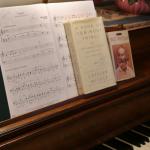Power: Trust Yourself
John Beckett
First Unitarian Universalist Church of Winnipeg
February 27, 2022
Who do you trust?
I love to travel. I used to travel for business a fair amount, although that ended long before Covid killed business travel. So, on a few occasions, I found myself sitting in an exit row. If you’ve ever been in an exit row or close to one, you know what happens. The flight attendant comes around and asks everyone “in the case of an emergency are you willing and able to open the emergency exit door?” I always give them the verbal “yes” they’re required to get. But then, either out loud or in my head, I always add “if that door has to be opened, I trust myself to do it a lot more than I trust someone I don’t know.”
Now, I’ve never opened an emergency exit door. I don’t know for sure that I can do it. But neither have any other passengers on that plane, and I trust myself to figure it out a lot more than I trust any of them.
Who do you trust?
When famous evangelist Billy Graham was a young man, he struggled with what he was told he had to believe – even though he was already preaching it. I think all of us who grew up in a conservative church can relate to that. He thought about his doubts for a while, but then he told a friend that “he didn’t have a good enough mind to settle deep theological questions.” And so he put his trust in what he had been told growing up and he ignored his own thoughts.
Who do you trust?
From a young age, we’re taught not to trust ourselves. Some of that makes sense. Children don’t have the knowledge to identify risks and to assess mitigation strategies. More than that, the part of the brain that assesses risk doesn’t completely mature until adulthood. Teenagers do risky things because they aren’t fully capable of identifying what’s dangerous and what’s not.
But the message we’re given when we’re six years old is never really reversed. And there are plenty of people who are happy to keep it that way. Because if we don’t trust ourselves, then we’re left trusting someone else, someone who not only doesn’t have our best interests at heart, but who doesn’t share our values.
It is good to trust each other. It is good to trust in people whose character and expertise demonstrate that they’re worth of your trust. This sermon, this service, isn’t about figuring out who we shouldn’t trust. It’s about learning to trust ourselves.
The nature of power in human societies
A quote attributed to Plato says that the only people qualified for public office are those who don’t want it. We’re not just afraid of exercising power ourselves – we don’t trust those who want power… often with good reason.
But the need and the opportunity for someone to exercise power is always there. Someone has to make a decision – even if it’s just to decide what to have for dinner tonight.
Once a decision is made, someone has to implement it. Someone has to make sure everything that needs to get done does get done. And someone has to set and enforce standards: this we will do and this we will not do.
If you don’t do it, someone else will.
Another quote attributed to Plato says that the penalty for refusing to participate in politics is that you end up being governed by your inferiors. In the United States, voter turnout is typically under 60% in Presidential elections and lower than that in mid-term elections. In Canada, the average is only slightly higher. And that’s just for voting – it says nothing about actually running for office.
When we abandon our power, it doesn’t go away. It’s always picked up by someone – someone who may use it in ways we would prefer they not.
Reclaiming power as individuals
Power is more than elections, whether for Parliament or Congress, or for the local church board. Power is also how we live our lives day to day, how we make choices that are either in the best interests of ourselves and our communities and in alignment with our values, or not.
We’ve been taught all our lives to give up our power, to not trust ourselves. We can’t change that with the flip of a switch. I occasionally see people post pretty pictures on social media with text that says “I call all of my power back to me now.” That can be a good start, but in and of itself it doesn’t accomplish much.
I’ve found six steps that use the power we already have – that we still have – to reclaim our power and to learn to trust ourselves.
The first is the power to observe. Before we do anything, we stop, and look, and listen. What do we see? What do we hear? What’s really there?
As a Pagan, I often deal with things many UUs find incredible, or at least, unlikely. I tell people – and myself – that our experiences are always real, and we shouldn’t let other people tell us we didn’t really see and hear and do what we know we saw and heard and did. At the same time, our interpretations of those experiences may be more accurate or less accurate, more helpful or less helpful. The key is to separate the experience from the interpretation.
We begin to reclaim our power by finding the facts and by separating them from our ideas about what those facts mean – and especially from other people’s ideas about what they mean.
The second is the power to reason. Once we observe something, we have to figure out what it means – if it means anything.
At its core, reason is the proper attribution of cause and effect. But too often we confuse correlation with causation. We make logical inferences that sound reasonable and perhaps are reasonable, but that don’t hold up under testing. And even when our logic is sound, we have an evolutionary urge for simplicity. We’re looking for the cause or the effect. In reality, life is far more complicated than that – a single outcome usually has many contributing causes.
Using the power to reason means refusing to settle for simple answers and digging for better answers.
The third is the power to reject other people’s stories. As important as facts and reason are, they rarely win arguments. Stories win arguments. Stories win elections. But when we examine the stories some people tell us, we find that they don’t match up with reality, or that they’re not in alignment with our values. We can reject these stories.
When people tell us stories about who they are and the challenges they face in life, compassion demands that we listen, and listen closely. But when those in power tell us stories designed to frighten us into giving them even more power, integrity demands that we evaluate their stories very carefully.
We can reject unhelpful stories from the world of politics. We can reject unhelpful stories from the world of advertising. We can reject unhelpful stories from the world of religion.
We have the power to reject other people’s stories.
The fourth is the power to choose. Rejecting someone else’s story is only one step. If we don’t fill that vacuum, old ways of thinking will creep back in. We need better stories, better ideas, better ways of thinking.
There are many stories. There are many approaches to the Big Questions of Life. There are many ways to live in community with other people and other species. Pick one.
No, it’s not that simple. These are questions to be approached with deep reflection and consideration. But for every religious, political, or cultural issue, there are many possible approaches. You have the power to choose which one seems most right to you and best for you and your community.
The fifth is the power to begin. It’s hard to accept the responsibilities of power. It’s hard to convince ourselves that we’re better off trusting ourselves after a lifetime of being told to just follow along. But we don’t have to get there all at once. We just have to begin.
Start with one thing. Read one book. Pick up one new spiritual practice. Just ending something from your old ways isn’t going to be enough – you have to fill the vacuum with something better.
Changing your life takes work and it takes time. But you have the power to take baby steps in that direction… and before long, baby steps become adult steps.
The sixth is the power to persevere. A quote of uncertain origins says that half of life is just showing up. But the other half is sticking with things long enough for them to pay off. It’s not quitting when things get hard or unpleasant, or when unexpected obstacles arise. It’s remembering why you started a journey in the first place, and what you expect to find when you get there.
We have the power to keep going.
Power is additive – who’s on your side?
Truly reclaiming our power – not through pleasant words but through action – is a good and necessary thing. But when we try to exercise that power in the wider world, we soon find that our power has limits. We are single individuals, and we often find ourselves opposed by parties, governments, corporations, and other collectives that are far more powerful than we can ever hope to be by ourselves.
The good news is that power is additive. Who’s on your side? Perhaps more importantly, who’s at your side? Who’s standing with you, walking with you, as you reclaim your power, and as you oppose those who are using power unethically and ineffectively?
And also, who are you standing beside? Who are you supporting, at a personal level, at a community level, at the level of all of humanity?
As a Pagan, I would be remiss if I didn’t point out that our ancestors are usually our most accessible allies. They lived through wars, famines, and plagues. If they hadn’t made it through, you quite literally wouldn’t be here. They live on in you. You carry their genes, and you carry their stories. Your continuation is their continuation. Your success is their success. Whether you believe they’re spirits who can intercede on our behalf, or if you believe they’re memories that can inspire and strengthen us – or both – if you’re feeling weak, go talk to your ancestors. And then listen.
Keeping yourself from being corrupted
Reclaiming your power is a good thing. Exercising power is a good thing. Still, we remember Lord Acton’s words “power corrupts and absolute power corrupts absolutely” – and we see evidence he was right. How can we avoid falling into that trap?
One way is to stay connected to our core values and virtues, and the best way to do that is through regular spiritual practice. Prayer, meditation, and offerings. Reading and study. I’m a UU and a Pagan – both sides of that identity love books. When we read and contemplate what we read, we remember why we wanted to exercise power in the first place – to make the world a better place, or at least, our little corner of it.
Another way is to make sure you’ve got at least one friend, one colleague, who won’t put up with any garbage from you. Someone who shares your values and wants to be sure you stay committed to them. Someone who can ask “are you sure you want to do that?” Or when necessary, someone who can tell you “no” – and who you trust enough to believe them when they say it.
We all need someone who can tell us “no.”
Who do you trust?
Plato was right. The only people qualified to hold public office are those who don’t want it. But someone has to hold those offices. Someone has to exercise power. Someone has to open that emergency exit door, and it might as well be you.
Who do you trust to choose a religious and spiritual path for yourself? Who do you trust to promote the virtues and values that build a healthy community, a healthy church, and a healthy world?
We have the power to observe and to reason. We have the power to reject unhelpful stories and choose better stories. We have the power to begin, and to persevere.
Who do you trust? Let’s trust ourselves.
Benediction
It’s good to be with you. For all the shortcomings of on-line church services, they open up the possibility of guest speakers from anywhere in the world, and I’m honored that you chose me for today.
The world always presents challenges. Whether our challenges are greater than those of previous generations or if they just seem that way because we’re the ones experiencing them is a question best left to future historians. What we know is that there are challenges to our Unitarian Universalist values, in Manitoba, here in Texas, and around the world. Many of those challenges exist because power is in the hands of people unworthy to wield it.
The alternative is to reclaim our power, first as individuals and then as communities. That process is complicated, and it’s scary, and it’s a lot of work.
But somebody has to open that emergency exit door. It might as well be you.
May the blessings of the Gods and ancestors be with you, now and in the days to come.


















